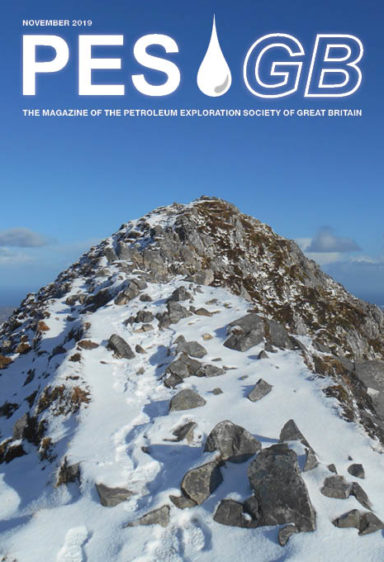PESGB November 2019
Plus much more inside
 The PESGB and Energy Transition …
The PESGB and Energy Transition …
Earlier this year (July edition of the PESGB Magazine) I wrote about the challenges that faced the oil and gas industry, in particular the younger members of our profession whose skills sets will need to evolve and adapt as an inevitable energy transition occurs. Although the article was written to promote support for the younger cohort of our Society, it did attract criticism that I was being too acceptant of the arguments being made in support of anthropogenic climate change. This was not my intent. Having entered the industry in the mid-1980s and been fortunate to remain in continuous employment, I am proud of the role and contribution petroleum geoscientists and engineers have made to ensure that a seamless supply of energy has continued to meet global demands. Indeed, fossil fuels provide around 80% of the current world energy demand. Closer to home, natural gas production forecasts made by the Oil and Gas Authority for the UK Continental Shelf, indicate the UK would be reliant upon imported gas to meet 86% of demand by 2050. Such a level of imports represents a significant increase from today where 50% of the UK’s natural gas is imported. This transition already represents a considerable change to the industry I joined.
Nevertheless, rumours that geoscientists belong to a dying profession are grossly exaggerated! That is not to say that, because the demand for energy will continue, the geoscience community should not have a role to play and a contribution to make as the energy transition takes place. There will continue to be opportunities in traditional petroleum science, whilst new initiatives such as Carbon Capture and Storage are piloted. Academics that include Jon Gluyas at Durham University (Energy Institute) are leading the development of analytical models that address fluid migration and trapping in the subsurface – expertise that is familiar to geoscientists working in petroleum exploration and production.
There has been a lot of emotive discussion surrounding the politics and science of anthropogenic climate change. The PESGB has not and will not engage in the public debate. Instead, rather than challenge these issues, the PESGB has a role “… to promote, for the public benefit, education in the scientific and technical aspects of petroleum exploration”. The PESGB will endeavour to support its membership through jointly hosted events with affiliated organisations to facilitate the issues attached to a future energy transition. These are at an early stage of development but will endeavour to address the triggers that will pace a prospective energy transition and the industry opportunities that may emerge. These events will also examine what the future may look like for petroleum geoscientists and how they can position themselves to contribute to, and benefit from, the changes taking place within our industry. This will address not only the individual but also the corporate perspective.
The PESGB will continue to provide an update with regard to supporting its membership during the energy transition. In the meantime, I thought I could finish with a quote from John F. Kennedy:
“Change is the law of life and those who look only to the past or present are certain to miss the future”.


